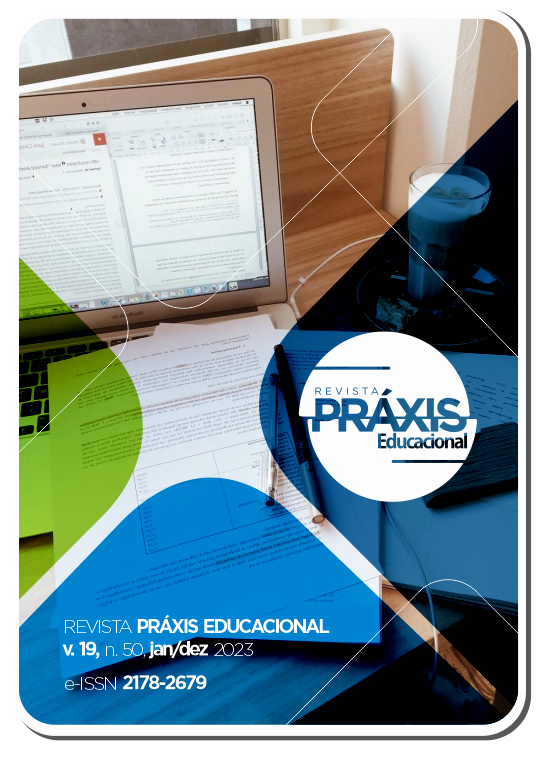Trajetória profissional de professores de matemática experientes na busca pela profissionalização docente
DOI:
https://doi.org/10.22481/praxisedu.v19i50.11645Palavras-chave:
Educação Matemática, formação de professores, identidade profissionalResumo
O objetivo deste artigo é discutir ações da trajetória profissional de professores de matemática experientes que marcaram a sua Identidade Profissional (IP) na busca pela profissionalização docente. Essa pesquisa caracteriza-se como qualitativa de cunho interpretativo. Os quatro professores investigados atuam/atuaram por mais de dez anos na Educação Básica ou na formação inicial e continuada de professores. As ações da trajetória profissional dos professores investigados que marcaram a sua IP na busca pela profissionalização docente estão associadas à: compreensão de conteúdos matemáticos e de como ensiná-los; defesa e fundamentação de suas crenças/concepções a respeito da prática do professor; organização do trabalho docente para desenvolver uma aula na perspectiva do Ensino Exploratório. Conclui-se que estudar ações da trajetória de professores experientes em contextos de formação pode representar uma alternativa para que (futuros) professores sejam provocados a (re)pensar seus processos de aprendizagem profissional na busca de sua profissionalização.
Downloads
Metrics
Referências
BARBOSA, Cirléia Pereira.; LOPES, Celi Espasandin. Um estudo sobre a identidade profissional de futuros professores de Matemática no Estágio Curricular Supervisionado. Educação Matemática Debate, Montes Claros, v. 4, p. e202035, 2020.
BORKO, Hilda, PUTNAM, Ralph T. Learning to teach. In: BERLINER, David C.; CALFEE, Robert C. (org.). Handbook of educational psychology. New York: Macmillan, 1995. p. 673-708.
BROWN, Laurinda; COLES, Alf. Mathematics teacher and mathematics teacher educator change – insight through theoretical perspectives. Journal of Mathematics Teacher Education, Bristol: Springer, v. 13, p. 375-382, 2010. DOI: 10.1007/s10857-010-9159-3. Disponível em: https://link.springer.com/article/10.1007/s10857-010-9159-3. Acesso em: 20 maio 2023.
CLARKE, David; HOLLINGSWORTH, Hilary. Elaborating a Model of Teacher Professional Growth. Teaching and Teacher Education, v. 18, p. 947-967, 2002.
CYRINO, Márcia Cristina de Costa Trindade. Identidade profissional de (futuros) professores que ensinam Matemática. Perspectivas da Educação Matemática, Campo Grande, v. 10, p. 699-712, 2017.
DARRAGH, Lisa. Identity research in mathematics education. Educational Studies in Mathematics, v.93, n.1, p.19-33, 2016.
DE PAULA, Ênio Freire. Identidade Profissional de Professores que Ensinam Matemática: indicativos de pesquisas, elementos e ações para elaboração de uma proposta investigativa. 2018. 227 f. Tese (Doutorado em Ensino de Ciências e Educação Matemática) – Universidade Estadual de Londrina, Londrina, 2018.
HARGREAVES, Andy. Development and desire: A post-modern perspective. In: GUSKEY, Thomas. R.; HUBERMAN, Michael (org.). Professional development in education: New paradigms and perspectives. New York: Teachers College Press, 1995. p. 9-34.
HONG, Ji; DAY, Christopher; GREENE, Barbara. The construction of early career teachers’ identities: coping or managing? Teacher Development, v. 22, n. 2, p. 249-266, 2018. DOI: 10.1080/13664530.2017.1403367. Disponível em: https://www.tandfonline.com/doi/abs/10.1080/13664530.2017.1403367?journalCode=rtde20. Acesso em: 20 maio 2023.
IMPEDOVO, Maria Antonietta. Identity and Teacher Professional Development: a Reflective, Collaborative, and Agentive Learning Journey. Switzerland: Springer, 2021.
INGRAM, Jenni; BURN, Katharine; FIDDAMAN, Jen; PENFOLD, Colin; TOPE, Clare. The Influence of and Interactions Between Different Contexts in the Learning and Development of Mathematics Teacher Educators. In: GOSS, Merrilyn; BESWICK, Kim (org.). The Learning and Development of Mathematics Teacher Educators: international perspectives and challenges. Switzerland: Springer International Publishing, 2021. p. 263-280.
KELCHTERMANS, Geert. Early career teachers and their need for support: Thinking again. In: SULLIVAN, Anna; JOHNSON, Bruce; SIMONS, Michele. Attracting and keeping the best teachers. Switzerland: Springer International Publishing, 2019. p. 83-99.
LARROSA, Jorge. Notas sobre a experiência e o saber de experiência. Revista Brasileira de Educação, n. 19, p. 20-28, jan./abr. 2002.
LÜDKE, Menga; ANDRÉ, Marli Eliza Dalmazo Afonso. Pesquisa em Educação: abordagens qualitativas. 2. ed. Rio de Janeiro: E.P.U., 2014.
LUTOVAC, Sonja; KAASILA, Raimo. Future Directions in Research on Mathematics-Related Teacher Identity. International Journal of Science and Mathematics Education, v. 16. p.759-776, 2018.
OLIVEIRA, Hélia Margarida; MENEZES, Luis; CANAVARRO, Ana Paula. Conceptualizando o ensino exploratório da Matemática: contributos da prática de uma professora do 3.º ciclo para a elaboração de um quadro de referência. Quadrante, Lisboa, v. 22, n. 2, p. 29-53, 2013.
RODRIGUES, Paulo Henrique; CYRINO, Márcia Cristina de Costa Trindade; OLIVEIRA, Hélia Margarida. The search for the sense of agency in vulnerable situations in mathematics teachers’ initial education. The Mathematics Enthusiast, v. 19, n. 1, p. 158-186, 2022.
SCHUTZ, Paul A., FRANCIS, Dionne Cross; HONG, Ji. Research on teacher identity: Introduction to mapping challenges and innovations. In: SCHUTZ, Paul A.; FRANCIS, Dionne Cross; HONG, Ji (org.). Research on teacher identity. Springer, 2018. p. 3-9.
WILLIS, Royce; LYNCH, David Ernest; PEDDELL, Lewis. Development of a teacher of mathematics identity (ToMI) scale. Mathematics Education Research Journal, jul. 2021. DOI: 10.1007/s13394-021-00391-w. Disponível em: https://link.springer.com/article/10.1007/s13394-021-00391-w#citeas. Acesso em: 20 maio 2023.
Downloads
Publicado
Como Citar
Edição
Seção
Licença
Copyright (c) 2023 Práxis Educacional

Este trabalho está licenciado sob uma licença Creative Commons Attribution-ShareAlike 4.0 International License.
Você é livre para:
Compartilhar - copia e redistribui o material em qualquer meio ou formato; Adapte - remixe, transforme e construa a partir do material para qualquer propósito, mesmo comercialmente. Esta licença é aceitável para Obras Culturais Livres. O licenciante não pode revogar essas liberdades, desde que você siga os termos da licença.
Sob os seguintes termos:
Atribuição - você deve dar o crédito apropriado, fornecer um link para a licença e indicar se alguma alteração foi feita. Você pode fazer isso de qualquer maneira razoável, mas não de uma forma que sugira que você ou seu uso seja aprovado pelo licenciante.
Não há restrições adicionais - Você não pode aplicar termos legais ou medidas tecnológicas que restrinjam legalmente outros para fazer qualquer uso permitido pela licença.










